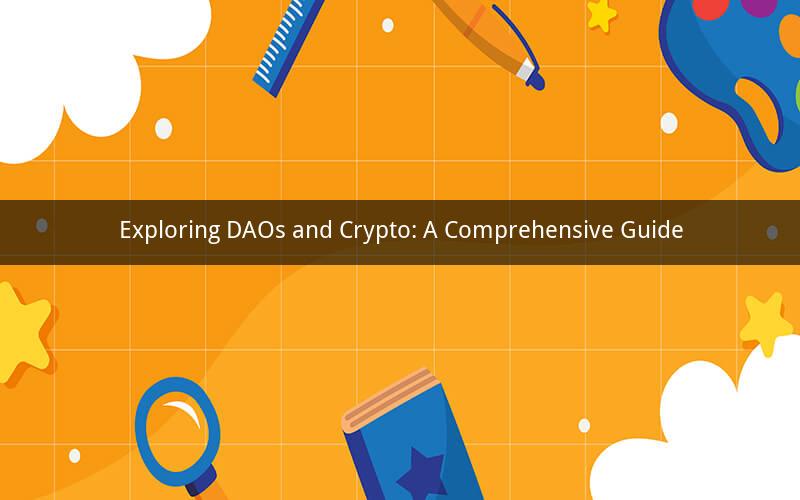
Decentralized Autonomous Organizations (DAOs) and cryptocurrencies have emerged as transformative forces in the digital economy. As blockchain technology continues to evolve, understanding the intersection of DAOs and crypto is essential for anyone interested in the future of finance, governance, and innovation. This article delves into the concept of DAOs, their relationship with cryptocurrencies, and the potential impact on various sectors.
1. What is a DAO?
A DAO is a decentralized, autonomous organization that operates through smart contracts on a blockchain platform. Unlike traditional organizations, DAOs eliminate the need for a central authority or hierarchical structure. Instead, they are governed by a set of rules encoded in code, ensuring transparency, accountability, and security.
The core principle of a DAO is to leverage blockchain technology to facilitate trustless interactions among members. By automating processes and decisions, DAOs aim to create a more efficient and equitable system for collaboration and governance.
2. How do DAOs work?
DAOs operate on the principle of tokenization, where a cryptocurrency token represents ownership and governance rights within the organization. Members can purchase tokens to become shareholders, and these tokens can be used to vote on proposals, propose changes to the DAO's rules, and access various benefits.
The workflow of a DAO typically involves the following steps:
- Proposing: A member submits a proposal, which is then reviewed by the community.
- Voting: Members vote on the proposal using their tokens, with the most votes determining the outcome.
- Execution: If the proposal passes, the smart contract automatically implements the decision.
- Monitoring: The DAO continuously monitors its performance and adjusts its strategies as needed.
3. The relationship between DAOs and cryptocurrencies
Cryptocurrencies play a crucial role in the functioning of DAOs. Here's how they are interconnected:
- Tokenization: Cryptocurrencies enable tokenization, which is the process of representing ownership and governance rights within a DAO.
- Governance: Cryptocurrencies serve as a medium for voting and decision-making within the DAO.
- Funding: DAOs often raise capital through token sales, known as Initial Coin Offerings (ICOs) or Security Token Offerings (STOs).
- Transactions: Cryptocurrencies facilitate secure and transparent transactions within the DAO, reducing costs and eliminating the need for intermediaries.
4. The potential impact of DAOs and crypto on various sectors
DAOs and crypto have the potential to disrupt various sectors, including:
- Finance: DAOs can streamline financial operations, reduce costs, and democratize access to capital.
- Governance: By eliminating the need for intermediaries, DAOs can create more transparent and accountable governance systems.
- Innovation: DAOs can foster collaboration and innovation by allowing diverse groups of people to work together without the constraints of traditional organizational structures.
- Real estate: DAOs can revolutionize the real estate industry by enabling decentralized ownership, transparent transactions, and efficient management.
- Art and culture: DAOs can provide a platform for artists and creators to distribute their work, receive fair compensation, and engage with their audience directly.
5. Common questions about DAOs and crypto
Question 1: What are the advantages of DAOs over traditional organizations?
Answer: DAOs offer several advantages, including increased transparency, accountability, and efficiency. By eliminating the need for a central authority, DAOs can reduce costs, streamline processes, and empower members to participate in governance.
Question 2: Can DAOs be used for malicious purposes?
Answer: Like any technology, DAOs can be used for both positive and negative purposes. However, the inherent transparency and accountability of DAOs make it more difficult to engage in malicious activities compared to traditional organizations.
Question 3: How do DAOs ensure security?
Answer: DAOs rely on blockchain technology, which is inherently secure. By using smart contracts, DAOs can automate processes and ensure that decisions are executed as intended. Additionally, the decentralized nature of blockchain makes it difficult for attackers to compromise the system.
Question 4: What are the potential challenges of DAOs?
Answer: Some of the potential challenges of DAOs include governance issues, regulatory hurdles, and the complexity of implementing smart contracts. Additionally, the lack of a central authority can make it difficult to address conflicts or make decisions quickly.
Question 5: How can individuals get involved in DAOs?
Answer: Individuals can get involved in DAOs by purchasing tokens, participating in discussions, and contributing to the community. By engaging with the DAO, members can help shape its future and potentially benefit from its success.